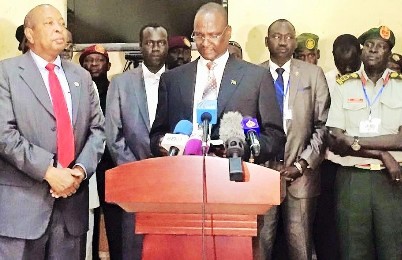SPLM-IO says “unrealistic” to form transitional government this week
February 4, 2016 (ADDIS ABABA) – Leadership of the armed opposition faction led by former Vice-president, Riek Machar, said they wished a Transitional Government of National Unity (TGoNU) would have been formed in the first week of February as called for in the recent communiqué of the Intergovernmental Authority on Development (IGAD), but said it was too soon and unrealistic.

In a communiqué issued by IGAD on Sunday, 31 January, in the Ethiopian capital, Addis Ababa, the regional bloc called on the South Sudanese parties to the peace deal, signed in August 2015, to form a transitional government of national unity in the first week of February.
The communiqué also called on the parties to implement the first phase of the provisions of the security arrangements, particularly the deployment of joint police and military forces in the capital, Juba, prior to formation of the transitional government.
Dak said the decision to form the transitional unity government in the first week of February was “positive but too soon” as the opposition faction was still looking for assistance to transport its troops from hundreds and thousands of kilometres away to the capital.
“You know we don’t have resources to transport our forces on our own. Even our advance team to Juba was transported through external assistance. The leadership has therefore asked for additional assistance from international partners in the peace process to soon transport our troops to the capital,” he said.
He said the arrival of the opposition forces to Juba (1,500 police and 1,410 military force, etc) will depend on how soon facilities for transporting them are availed, adding that it may take about two weeks for the forces to arrive in Juba with their military equipment.
He called on President Salva Kiir’s government to join the armed opposition faction of the Sudan People’s Liberation Movement (SPLM-IO) in soliciting assistance from the international community to transport the troops so as to soon form a new government.
Juba, he added, was also supposed to be demilitarized by withdrawing government troops to 25km outside the capital in accordance with the security arrangements. Government however said it has no money to establish military camps for the the troops and provide them with basic services such as water, shelter and medical facilities outside the capital.
Dak said as soon as the opposition forces enter Juba, Machar will return to the capital for formation of the transitional unity government with President Kiir after he takes oath of office as First Vice-president.
The top opposition leader will become First Vice-president of the new transitional government in which he will have more powers than he had before when he was Vice-president prior to the 2013 crisis.
In addition to shared executive powers in the presidency, Machar will have 10 national ministers nominated by him, a sizeable number of members of national parliament in Juba as well as govern the oil producing states in the country’s Upper Nile region.
He will also continue to command a separate opposition army from that of the government as their commander-in-chief with a military structure headed by a chief of general staff who will be reporting directly to him for at least the coming one and a half years before unification of the two armies.
(ST)
